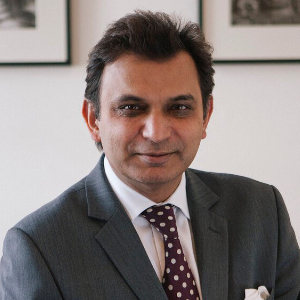Faculty

Prokar Dasgupta
- Professor Prokar Dasgupta OBE, MSc, MD, DLS, FRCS (Urol), FEBU, FLS, FKC
- King’s Health Partners Foundation Professor of Surgery
- Chair in Robotic Surgery and Urological Innovation
- Chairman King’s-Vattikuti Institute of Robotic Surgery
- Faculty of Life Sciences and Medicine, King’s College London (KCL)
- Hon. Consultant Urologist, Guy’s and St. Thomas’ NHS Foundation Trust, London
- 10th Editor in Chief, British Journal of Urology International (BJUI)
Prokar Dasgupta, King’s Health Partners (KHP) Foundation Professor of Surgery, is internationally reputed as a clinician-scientist, educator, polymath and 10th Editor-in-Chief of the British Journal of Urology International (BJUI).
He pioneered robotic surgery in Urology in the UK, and with the help of The Urology Foundation, trained and mentored several consultant surgeons and over 30 fellows both nationally and internationally. He was the first to develop image guided and 3D printed prostatectomies, indentation probes for precise localisation of tumours and is Ambassador for the KCL-Ericsson 5G Global health program in telemedicine. He was Chief Investigator for the world’s first randomised controlled trial of telerobotics and the only trial comparing open, laparoscopic and robotic cystectomy. He leads healthcare within the Responsible AI-UK ecosystem funded by the UKRI.
Twenty-five years ago, while at Queen Square, Prokar studied the role of C-fibres in overactive bladders (OAB) in humans and then developed a method of injecting botulinum toxin-A with a flexible telescope, the “Dasgupta technique”. International trials of the toxin led to its licensing for OAB, improved the quality of life of millions of patients worldwide and influenced National Institute of Health and Care Excellence (NICE) Guidelines. In recognition of his achievements, he received the Golden Telescope in 2006 and was appointed Professor of Robotic Surgery & Urological Innovation, KCL and Chairman of the King’s-Vattikuti Institute of Robotic Surgery. His institution recently celebrated the landmark of 10,000 robotic procedures. He was the 2020 recipient of the St. Peter’s Medal from the British Association of Urological Surgeons (BAUS).
He has made major contributions to the study of mucosal cell biology, focusing on receptor function in the bladder and targeted immunotherapy in prostate cancer, receiving a patent for a first in man use of a cytotopic agent. Clinical chair of the Prostate Cancer Research Centre at KCL, he currently leads a large research team of basic scientists, engineers and clinician-scientists and has generated multi-million in grant income from the MRC, Wellcome Trust, EPSRC, UKRI, EU, the Guy’s and St. Thomas Charity and The Urology Foundation. Prokar has published >1100 articles, H-index of 87 with >800 papers, 35 book chapters, 10 books, >500 presentations, >300 invited lectures and 50 Visiting Professorships. He has been Visiting Surgeon to Maharaja Gaj Singh II of Jodhpur, India.
He is acknowledged as a leading educationalist, starting a successful BSc in Surgical Science at KCL, training over 300 students and looking for the evidence underpinning simulation in operative surgery, human factors and patient safety. He developed the world’s first laparoscopic nephrectomy simulator, led the EU-MARS project of the development and validation of robotic surgical training and the only international randomised trial of simulation for patient benefit – the SIMULATE study, showing that simulation creates more proficient surgeons and reduces surgical complications in patients.
He is a highly effective educator and communicator, editing the BJUI for 8 years, trebling its impact factor to 6 and achieving an Altmetric score of 1469. He led an international editorial team that revolutionized web-based publishing and the responsible use of social media. He brought innovative design, artificial intelligence (AI) and the new open access platform, BJUI Compass, to the BJUI family of journals.
Prokar was elected the youngest ever, Hunterian President and served on the Associated Parliamentary Committee for Surgical Services in the House of Lords, UK. He is also known for his services to charity, serving as a Trustee to the Prostate Cancer Research Centre and the Malcolm Coptcoat Trust. He is a mentor and advisor to the UK National Clinical Entrepreneurship Program. He has supported the careers of 20 UK and international academics, 10 to Chairs. He has established several academic collaborations with Universities in Europe, India, the far East and Southern China. He is the Clinical Director of Surgical and Interventional Engineering at KCL, part of the ambitious MedTech Hub at St. Thomas’ Hospital with a budget of £110 million.
He was awarded the Fellowship of the King’s College (FKC), King’s highest honour, membership of the Academic Association of European Urologists, the American Association of Genitourinary Surgeons and the Honorary Membership of the Urological Society of Australia and New Zealand.
Prokar has supported the EAU as a founding member of the European Association of Urology Robotics Section (ERUS). He served on the ERUS board for a decade and demonstrated ethical live surgery and new technologies for 20 years. His team was integral to the development and validation of the first international curriculum in robotic surgery which has now become the standard of care for training and patient safety worldwide. He is the recipient of the Wickham Lifetime achievement award 2024.
He was created the King James IV Professor of the Royal College of Surgeons of Edinburgh in 2021 for which he delivered a public lecture at the famous Royal Institution in 2022. He was a Padma Shri awardee from President Kovind of India in 2022. He was awarded an OBE (Officer of the Most Excellent Order of the British Empire) in 2023 in the historic post coronation honours list by King Charles III for services to Surgery and Science.
During the COVID-19 crisis he published BJUI blogs from Italy, China, New Zealand and South Korea, which helped the planning of surgical services in the UK and internationally. With a team of international scientists, he studied trained immunity against the virus in health care workers after injection of BCG and published the results in Frontiers in Immunology, one of the top journals in the field. Through his role as Professor of Surgery at KHP, Prof Dasgupta was integral to bringing the LifeLines Project to the All India Institute of Medical Sciences, Rishikesh, India.
He is a marathon runner, a reasonable cook and an avid tennis fan.
